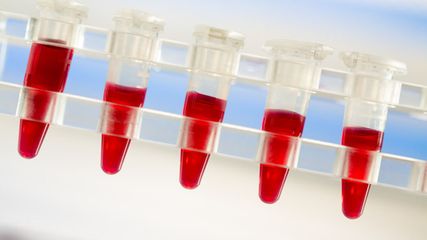
©
Getty Images/iStockphoto
First-in-human CLL1-CD33 compound CAR T cells
Jatros Digital
30
Min. Lesezeit
15.06.2018
Weiterempfehlen
<p class="article-intro">A study presented at the EHA Annual Meeting investigates the anti-leukemic activity of the CLL1-CD33 compound CAR (cCAR) in vitro and in vivo in order to offer treatment opportunities for refractory and relapsed acute myeloid leukemia (AML) patients.</p>
<hr />
<p class="article-content"><p>CAR T cell therapies for CD19<sup>+</sup> lymphoid malignancies have recently shown success in clinical studies. CAR T cells for myeloid malignancies including acute myeloid leukemia are still being explored in (pre)clinical trials.</p> <p>In the presented study a compound CAR was generated that contains two independent complete units targeting CD33 for a bulky leukemia and CLL1 for leukemic stem cells. In vitro assays indicated that CLL1-CD33 cCAR had specific anti-tumor activity against cell lines engineered expressing CLL1 or CD33, as well as leukemia samples from AML patients.</p> <p>In mouse models generated by cell lines engineered expressing CLL1 or CD33 and AML cell line U937 cells, the cCAR T cells significantly reduced tumor burden and prolonged survival. CD52 specific antibody CAMPATH could be used as a safety-switch to rapidly terminate cCAR therapy in mouse models. In the first-in-human phase-I-trial, CLL1-CD33 cCAR T cell therapy was safe and well tolerated, and achieved complete response (CR).</p> <p>This preclinical study has shown that the CLL-1-CD33 cCAR possesses consistent, specific, and potent anti-tumor activity against CLL-1<sup>+</sup> and/or CD33<sup>+</sup> leukemia cells in vitro and in vivo. cCAR may have advantages over single-CAR therapy in terms of reduction of disease relapse by targeting LSC and bulky AML population. Phase-I-trial for CLL-1-CD33 cCAR are underway.</p> <p><strong>Reference:</strong> <br /> <em>Liu F: First in human CLL1-CD33 compound CAR T cells as a two-pronged approach for the treatment of refractory acute myeloid leukemia. EHA Annual Congress, abstract # S149</em></p></p>
Das könnte Sie auch interessieren:
Erhaltungstherapie mit Atezolizumab nach adjuvanter Chemotherapie
Die zusätzliche adjuvante Gabe von Atezolizumab nach kompletter Resektion und adjuvanter Chemotherapie führte in der IMpower010-Studie zu einem signifikant verlängerten krankheitsfreien ...
Highlights zu Lymphomen
Assoc.Prof. Dr. Thomas Melchardt, PhD zu diesjährigen Highlights des ASCO und EHA im Bereich der Lymphome, darunter die Ergebnisse der Studien SHINE und ECHELON-1
Aktualisierte Ergebnisse für Blinatumomab bei neu diagnostizierten Patienten
Die Ergebnisse der D-ALBA-Studie bestätigen die Chemotherapie-freie Induktions- und Konsolidierungsstrategie bei erwachsenen Patienten mit Ph+ ALL. Mit einer 3-jährigen ...


